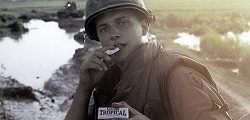‘I Am the Curse’: ‘Stranger Things’ Deals with Agent Orange

With the release of the fourth season of the Netflix’s sci-fi horror series “Stranger Things” in late May, the topic of the continuing impact of toxic exposure to Agent Orange was introduced to a new generation of Americans.
With a fanbase of 64 million households in Season 3, and Season 4 landing in Netflix’s No.1 viewership position in the show’s first week of release, there’s no doubt that the impact of toxic wounds on returned veterans has officially entered the zeitgeist. The Agent Orange-linked subplot is one among many in this new season, but interest in it has peaked because it centers on a fan-favorite character, police Chief Jim Hopper, brilliantly portrayed by David Harbour.
For more than 40 years Vietnam Veterans of America has advocated for veterans who have been living with chronic illnesses caused by exposure to Agent Orange during their military service. VVA’s Faces of Agent Orange campaign helps people see real stories and real people affected by Agent Orange exposure during the Vietnam War.
“I used to think I was cursed,” Hopper says about half an hour into Chapter (Episode) 5 that began streaming May 27, in one of the most emotionally charged scenes in a highly emotional series. So begins this fictional Vietnam War veteran’s Agent Orange story. Trapped in a Russian prison, Hopper struggles through a dark night of the soul, unburdening himself as he tells his story to an unlikely ally, a Russian guard who tried to help him escape.
Hopper recalls being drafted at 18 and going to Vietnam willingly to fight a war he didn’t understand. He wanted to prove himself a man, he says, and was assigned to the Chemical Corps. “I’m just a kid,” he says, “Eighteen years old and 8,000 miles away. Mixing up these 55-gallon drums of Agent Orange. Just these kitchen gloves, you know. No mask. Nothing.”
He continues to describe his daily exposure and his superiors’ assurances that the substance is not chemical warfare—it’s just “herbicide, kills plants. Harmless.” The story is followed by an account of what happens to Hopper and his buddies when they return home.
“The horror,” Hopper muses. “It followed us; it clung to us.” Veterans falling ill and dying; children born with congenital disabilities or stillborn; and the death of Hopper’s own daughter Sara of cancer at only 7-years-old. His marriage disintegrates; he loses himself in drugs and alcohol; and always holds himself responsible for it all. Shouldering all the guilt, Hopper concludes, “I wasn’t cursed. I am the curse.”
The six-minute scene hauntingly captures the experiences of Vietnam War veterans whose toxic wounds from their military service have continued for generations. “Stranger Things” is set in the early 1980s, roughly a decade after the end of the war. As we fast approach the 50th anniversary of the end of the war, we have seen second-, third- and even fourth-generation effects on veterans’ families.
The full cost of the Vietnam War has not yet been tallied. Hundreds of thousands of veterans and their progeny continue to need medical care and support. The generational toll of Agent Orange, both physical and mental, continues, and characters like Police Chief Hopper help remind people of the far-reaching effects of a war that younger generations know little about.
“Stranger Things” does an excellent job handling of such a complex character—a Vietnam vet with PTSD who’s struggling with substance abuse and carrying the toxic effects of Agent Orange. Through it all, he soldiers on as a central hero figure in the story. He’s a gruff, tormented, and grumpy hero, but a hero nonetheless, who opens his heart again and again, taking on the protector role and always fighting for what he believes is right.
— Kathleen Grathwol
June 9, 2022

